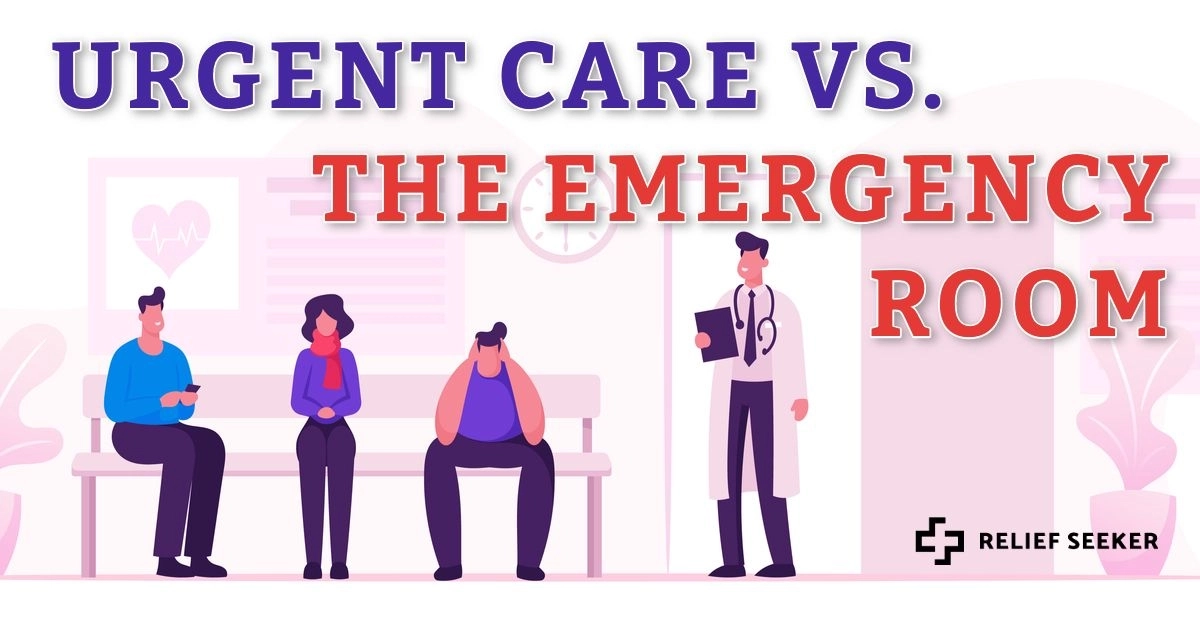You’re at a party (well, maybe not this year, but let’s pretend for the fun of it) walking towards the array of hors-d’oeuvres, and you swiftly trip, falling off your heels, land on your arm, and hear a crunch. Someone rushes over to help you up, and your arm starts to swell. Luckily, there’s a nurse in the house that tells you it doesn’t look broken but that you’ll definitely want to get your arm checked out ASAP. Now what?!
Do you go to the Emergency Room (ER) or Urgent Care?
Knowing when to visit both of these places can be confusing, especially if your primary care physician isn’t available by phone or there’s no medical professional around to suggest the best course of action.
Differences Between Urgent Care and the Emergency Room
It’s important to know where to go when you’re dealing with an injury or illness, and choosing the wrong one for the situation can be costly, a major waste of time, and perhaps even cost you your life.
Before we go on, let’s put this critical statement at the forefront of your mind; If you’re experiencing a life-threatening situation, please go to your nearest emergency room or call 911. Now that we’ve made that very clear let’s move on.
If you require immediate medical attention, your first thought might be to go directly to the ER. However, if your condition isn’t as serious as you initially thought, you may be turned away, and if you’re not, you would have had a much less expensive choice. Urgent care can provide the same exceptional care as an ER but will be kinder on your wallet. It is said that going to urgent care over the ER can save you hundreds if not thousands of dollars (depending on the type of insurance you have, if any).
Urgent Care Centers
Urgent care centers handle non-life-threatening situations. Many urgent care facilities have both doctors and nurses there to handle most things an ER can handle. These centers generally have access to x-rays and labs in-house. One of the biggest advantages of an urgent care center is that most are open late, on weekends, and most holidays.
The most common conditions that can be treated at an urgent care center are:
Back and joint pain
Earaches and ear infections
Minor cuts, sprains, and burns
Urinary tract infections (UTIs)
Cough, cold, or sore throat
Mild asthma
Minor animal bites
Suspected broken bone
Bug bite or sting
Minor flu symptoms
Because we like our readers to have all the facts and not that we’re trying to persuade you one way or another, there are a few important reasons a person would choose to visit urgent care over the ER.
According to the Urgent Care Association (UCA):
Waiting time at urgent care is considerably shorter than in an ER - Most patients, about 90%, can get in and out in an hour or less.
Urgent care fees are about a tenth of ER fees - The average cost of an ER visit is estimated at $1350. This makes an urgent care visit approximately $150 per visit.
Most urgent care centers take online appointments
Only 3% of urgent care patients actually need to be transferred to the ER.
Urgent Care At-Home Visits
Many urgent care clinics now offer at-home urgent care services (similar to an old school doctor house calls). One of the major benefits of these services is that you don’t need to go anywhere, saving time, energy, and a bunch of sick people won’t surround you.
These clinics send certified emergency medical technicians (EMTs) to your home to facilitate a virtual visit with a doctor or registered nurse. EMTs can share vitals with medical professionals and even provide data service for the appointment. They can also provide COVID-19 testing and antibody testing. One of the nice things about an at-home visit is that EMTs are also trained to help patients get to an emergency room if needed.
Most providers have the same insurance billing procedures and can bill traditional and other insurance plans, such as Medicare or Medicaid.
Right now, with many states continuing to observe the Shelter-In-Place orders, most at-home urgent care providers only offer virtual appointments. If you need a medical professional dispatched to your home, we recommend contacting:
Emergency Rooms
Emergency rooms are meant for medical emergencies only -- This is maybe why they’re called ERs (insert eye-rolling emoji here). ERs handle trauma, such as head trauma, x-rays, surgical procedures, and any other life-threatening situation. Emergency rooms are usually located in hospitals and are open 24 hours a day, seven days a week.
You will want to visit an ER if you’re experiencing the following:
Severe allergic reactions
Sudden numbness, weakness, dizziness, or loss of coordination
Constant or excessive coughing or vomiting blood
Disorientation or difficulty speaking
Excessive or uncontrolled bleeding
Overdose, accidental or otherwise
Blurred vision or sudden loss of vision
Heart attack, chest pain, or unusual chest pressure
Seizure or loss of consciousness
Severe asthma attack or prolonged shortness of breath
Severe burn
Broken bone with dislocation


